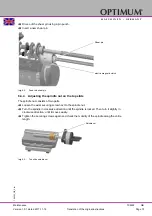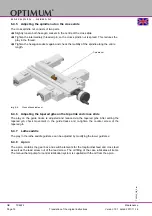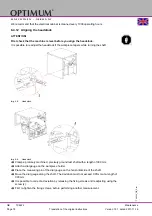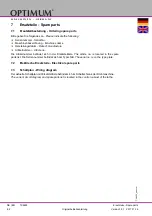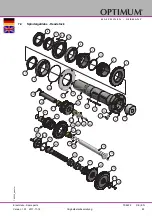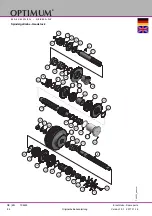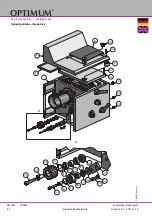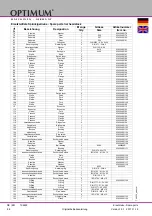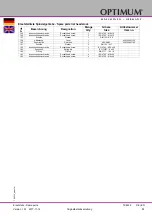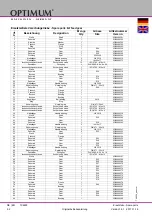
Maintenance
Version 1.0.1 dated 2017-11-16
Page 77
Translation of the original instructions
TX6222
GB
T
X
6222
_GB
_5.
fm
OPTIMUM
M A S C H I N E N - G E R M A N Y
®
6.4.9
Feed rod, Lead screw
The feed rod and lead screw is guided on the tailstock side by plane bearings in the radial
direction. The plain bearings require regular lubrication. With needle bearings before and after
the plane bearing, the axial direction is guided.
Img. 6-7:
Oiler for lead screw and feed rod
6.4.10 Lubricating and cleaning the lathe chuck
ATTENTION!
Do not use compressed air to remove dust and foreign substances from the lathe chuck.
Coolant squirts on the lathe chuck and removes the grease from the master jaws. In order to
maintain the tensioning force and the long-term accuracy of the lathe chuck, the lathe chuck
must be lubricated regularly. Insufficient lubrication will result in malfunctions at reduced ten-
sioning force, which affects the accuracy and causes excessive wear and seizing.
Depending on the chuck type and operating state, the tensioning force of a lathe chuck can
decrease by up to 50 percent of the nominal tensioning force.
A presumably securely clamped workpiece can then fall out of the chuck during processing.
Lubricate the lathe chuck. Lubricate the lathe chuck at least once per week. The used lubricant
should be of high quality and provided for high pressure bearing surfaces. The lubricant should
withstand the coolant and other chemicals.
Numerous different lathe chucks are available on the market which distinguish themselves con-
siderably based on the lubricating method. Follow the operating instructions of the correspond-
ing lathe chuck manufacturer.
6.4.11 Cleaning the electrical cabinet
Although the electrical cabinet is con-
structed to shut off external air, foreign parti-
cles such as dust and dirt may enter the
cabinet when the door is open.
Accumulation of foreign particles on the
printed circuit boards or other electronic
components could cause machine malfunc-
tion.
Clean the inside of the electrical cabinet
regularly.
Remove dust inside electrical cabinet with a
vacuum cleaner. Do not use compressed air
to clean the electrical cabinet.
Never touch circuit boards or parts around
the connector. Also avoid hitting these parts
with the vacuum.
Oiler cup













